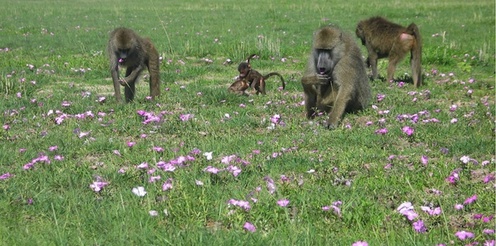ABRP Monitoring Guide
Here we provide a link to the Amboseli Baboon Research Project Monitoring Guide. This guidebook describes the procedures we use to collect all the data sets that allow us to monitor the demography, behavior, and habitat of the Amboseli baboons. This document also includes our protocols for collecting fecal samples. It is used as a guide for the permanent staff in Amboseli, for short-term visitors, and for visiting researchers pursuing their own projects.
ABRP Dominance rank assignments
This document explains how we assign dominance ranks to baboons in the study population. It also provides a comparison of our matrix-based method of rank assignments with a method based on Elo ratings. In general, we find very close concordance between matrix-based and Elo-based assignments, with some key differences that, in the aggregate, create an argument in favor of matrix-based assignments for our purposes. We discuss these differences in this downloadable document.
Amboseli Weather Data
Rainfall and temperature measurements from our analog weather stations from 1976 through the end of 2023. All data were collected by the Amboseli Baboon Research Project with primary support from the National Science Foundation. These files are updated annually. Please direct questions to Willi Wilber [wwilber@nd.edu]. Use of these data should be cited as "Alberts, S.C., Altmann, J., Archie, E.A., Tung, J., and the Amboseli Baboon Research Project. [date downloaded]. Rainfall records from the Amboseli Baboon Research Project. Retrieved from [https://amboselibaboons.nd.edu/downloads/]."
Alberts lab hormone protocol
This protocol describes the methods used to preserve fecal samples in the field, to extract steroid hormones from these samples, and to assay samples for hormone metabolites.
Alberts lab fecal genotyping protocol
This protocol describes the methods used to extract DNA from baboon fecal samples and genotype the baboons at 14 microsatellite loci.
Other data sets
If you are interested in using data generated by the Amboseli Baboon Research Project, we encourage you to visit the Dryad Data Repository (www.datadryad.org), Zenodo (https://zenodo.org/), Duke Research Data Repository(https://research.repository.duke.edu/), OSF (https://osf.io/), and NCBI )(http://www.ncbi.nlm.nih.gov/), where we have deposited a number of the data sets that underlie results in our publications. We have also provided links to the relevant available data sets in our alphabetical bibliography, which you can access here.
Our relational database, Babase
If you're interested in building a relational database for population and behavioral data for your population, see this page for key issues to consider. The source code for Babase is freely available and Open Source.













